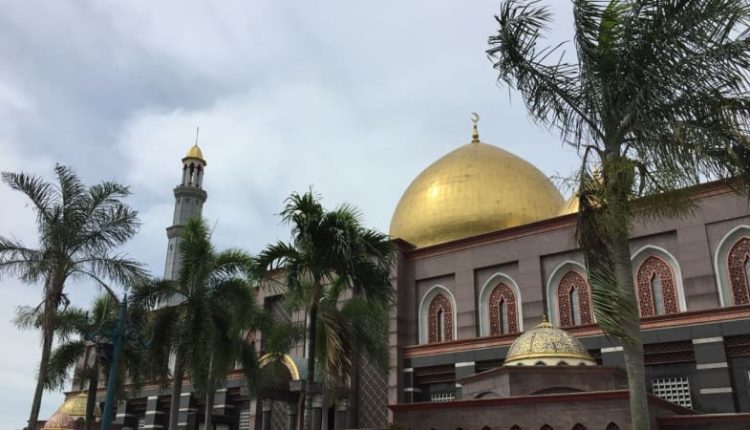Refuse Mosque Politization
By: Andri Hermansyah *
The party of democracy is getting closer. Various political people are busy formulating a winning strategy to get the desired position. Various attributes such as billboards, stickers and t-shirts become weapons to make a sound.
But violations for violations are indeed difficult to not suspect. In order to show their existence in a democratic party, they justify any means to get public attention, such as infiltrating events held by the government, or in lectures by inserting political speeches in places of worship.
Making mosques as a place to spread political speech is indeed unethical, considering that there are many worshipers in mosques who have different political ideologies.
One indication of the movement of politicization of mosques is the content of lectures or sermons that direct pilgrims to certain interests. If this happens then it does not rule out the possibility, the division of fellow believers will be difficult to avoid.
Judging from its function, the mosque functions as a place of worship and a place to get closer to Allah SWT. So that if the politicization of the mosque really exists, then it certainly degrades the function of the mosque itself.
The politicization of the mosque has indeed been applied to previous democratic parties by politicians. This is applied so that the group can gain votes from the worshipers. Some people often complain about black campaigns wrapped in shades of da’wah upholding Islamic law. This certainly has been rejected by the public if places of worship such as mosques are misused for political purposes.
In 2017, the action walked out or left the mosque when the sermon material contained political elements that had boomed. When at that time the community felt uncomfortable when the preacher who was supposed to convey religious teachings was tainted by political problems. Thanks to that, millions of people declared anti-politicization programs for mosques. This action aims to restore the function of the mosque properly.
At that time the mosque and its speakers often questioned certain issues that could bring down other candidates. The pulpit of preaching is often a silent witness to the lecturers who stressed the importance of choosing a faith leader. In addition, there were also banners containing the refusal of the mosque administrator to take care of the funeral of certain Cagub voters.
One of the polemics about the politicization of mosques that had occurred was Amien Rais, who at that time gave tausiyah in the recitation of ba’da subuh in South Jakarta. At that time he said that Amien Rais’s statement was considered to discriminate against several opposing parties as a satanic party. Whereas Allah’s party is a party coalition that is in accordance with Islamic law. In fact, every political party may have a cadre who is corrupt, and corruption is also one of the elements of Satan.
Maybe there are still some who ask why mosques are targeted for political activities. This has been explained by Reza Aslan as a religious observer. He said that although social media has a role in organizing the masses, its capabilities are no greater than the social networks that are built from activities in mosques.
If we look at history, activities in the mosque are not limited to worship only. At Zamah Rasulullah SAW until now, the mosque still holds the problem of the publicity of various dimensions. Muslim civilization also has a dependence on the place of worship, where the mosque becomes the central discussion of government, the strategy of war, deliberation and also education.
The Prophet Muhammad SAW made the mosque the center of control during his Caliphate. Various deliberations on consensus about nationality and nationality resulted from the assembly of worshipers in the mosque. Because it is so open, to the extent that the community plays a role in making government decisions.
The politicization of mosques does not mean voicing for Muslims to stay away from mosques, but the politicization of mosques must be rejected if the material in lectures or sermons contains material about speech, or invitations to overthrow other political parties.
The politicization of mosques is indeed not something taboo, history records that something that contains political elements departs from the place of worship. But of course there are fundamental differences. Where in the Prophet’s era the interests of the wider community were more dominant to be discussed than certain personal or group interests. That is the difference in the politicization of mosques at the time of the Prophet with the present.
People certainly should not be allergic to the word politics, because in all aspects of life, politics has a role to formulate various policies for the benefit of the people. For this purpose, before the democratic party, we as a society must be smart in distinguishing between politicization for the benefit of all people or politicization for the benefit of their own group.
Facing the perpetrators who spread slander or destructive lectures, certainly does not mean we are wary of mosques. But beware of social networks that cause political actors to get the stage to spread the utterance of hatred.
No less important is the effort to build the political literacy of the community. Because of the qualified political literacy, it will slowly shift the discussion about the pro and anti-strongholds – certain camps are the talks that discuss public policy.
If the community has good political literacy, then self-defeating and black campaign efforts will disappear from the pulpit of the mosque. In the end, the community will focus on substantial issues about what they can get as citizens.
This can certainly be an attempt to restore the function of places of worship such as mosques, so that it functions again as a place of deliberation without the existence of political tendencies in certain groups, so that there are no gaps for perpetrators of hate speech and practical political actors in the mosque.
* An Observer of Socio-Cultural Problem
